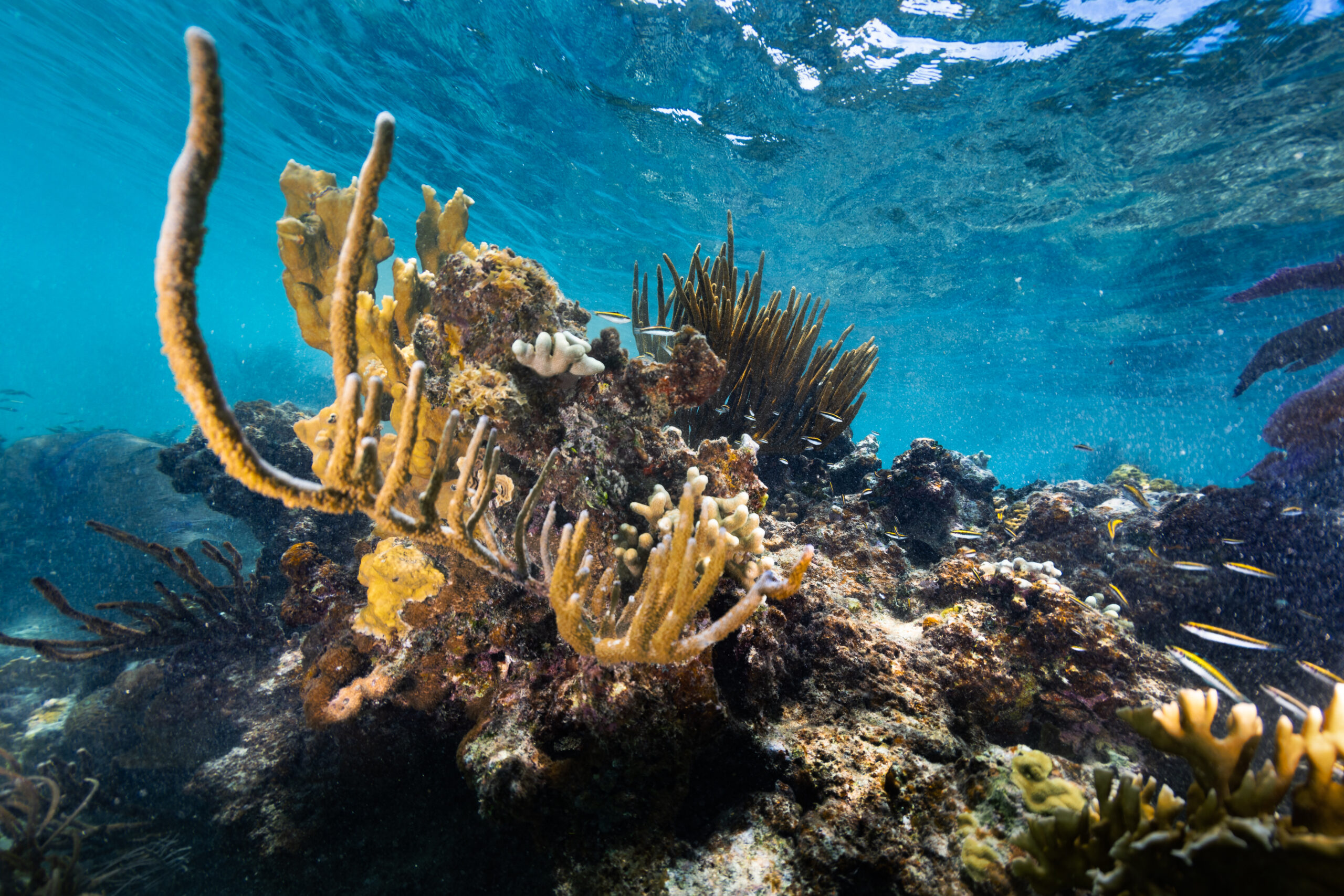Coral reefs, often referred to as the ‘rainforests of the sea’, occupy a mere 1% of the ocean floor yet are home to about 25% of all marine life. This comparison to rainforests highlights their immense biodiversity and ecological importance. Beyond their biological significance, coral reefs are vital to human societies, especially coastal communities. They serve as natural barriers against coastal erosion, protect shorelines from hurricane damage, and contribute significantly to the global economy, generating an estimated $36 billion annually.
In a discussion with Juan Torres-Pérez, a research scientist specializing in coral reefs at NASA Ames Research Center, we explored the science underlying these unique ecosystems and their crucial roles in supporting both marine life and human communities.
The Nature of Reefs
Reefs are essentially structures that rise above the ocean floor, providing habitat and protection for various marine species. These structures can be either natural or artificial. Torres-Pérez explains, "A reef by definition is a structure that provides some relief above the ocean floor. It could be something man-made: you can pile a bunch of car tires, and then they get colonized by different organisms. Or it could be natural: a small hill on top of the ocean floor in which the primary framework is a rock."
Corals, the primary architects of coral reefs, are fascinating creatures belonging to the phylum Cnidaria. They are typically found in warm tropical waters and form large colonies that we recognize as coral reefs. Each coral is composed of numerous small, living organisms known as polyps. These polyps, although small, work collectively to form the massive structures we see as coral colonies. Corals can be categorized into two main types: hard corals and soft corals. Hard corals, or Scleractinians, construct rigid skeletons from calcium carbonate, forming the backbone of coral reefs. In contrast, soft corals, sometimes referred to as Alcyonacea, are more flexible and do not contribute to reef building.
The vibrant colors of corals are attributed to tiny algae, called zooxanthellae, residing within their tissues. These algae engage in photosynthesis, supplying the corals with essential nutrients. "The majority of the products from photosynthesis, about 80 to 90%, pass on to the coral, and then the coral uses those for its own metabolism," Torres-Pérez notes. This symbiotic relationship explains why corals are predominantly found in shallow waters, where sunlight is abundant.
Coral Reefs: Ecosystem Engineers
A coral reef is defined as a reef primarily constructed by living corals. Torres-Pérez elaborates, "A coral reef is a reef whose main structure is made by living organisms, in this case, corals. A coral reef will always be a reef, but not all reefs are coral reefs." The Great Barrier Reef in Australia is the largest coral reef system globally, stretching over 1,000 miles and covering approximately 133,000 square miles.
Healthy coral reefs are indispensable for numerous reasons. They offer protection to coastlines, provide habitats for a multitude of marine species, and hold potential for medical breakthroughs. Coral reef ecosystems support a wide range of life forms, from tiny bacteria and phytoplankton to large predators like sharks and groupers, as well as reptiles like sea turtles.
Corals also act as natural barriers against powerful storms such as typhoons or hurricanes, significantly mitigating their impact. Studies indicate that coral reefs can reduce wave energy by up to 97%, thereby protecting coastal regions from severe damage. However, as coral reefs face degradation, coastal flooding and erosion have surged, posing increased risks to coastal communities.
Coral Reefs and Human Livelihoods
For many coastal and island communities, coral reefs are essential for sustenance and economic activities. "These are critical ecosystems, not only in terms of the whole biodiversity of the planet but because they also provide sustenance for millions of people, especially in island nations," Torres-Pérez emphasizes. Coral reefs support fisheries, recreational activities, and educational opportunities, forming the backbone of many local economies.
Moreover, scientists are investigating corals as potential sources for new medicines. Certain compounds derived from corals have been found effective against antibiotic-resistant bacteria. This has opened avenues for developing new antibiotics in laboratories, thereby conserving coral populations.
Threats to Coral Reefs
Despite their importance, coral reefs face numerous threats, primarily from climate change and human activities. A 2020 report by the Global Coral Reef Monitoring Network highlighted that approximately 14% of the world’s coral reefs have vanished since 2009. This decline is expected to worsen following the 2023-2024 global coral bleaching event.
Coral bleaching, largely driven by rising ocean temperatures, poses a significant threat to coral reefs. When water becomes too warm, corals expel their symbiotic algae, losing their color and primary food source. This leaves corals vulnerable and often leads to their death. "Eventually what happens is that the coral is too weak to compete with other organisms, like filamentous algae, that can overgrow the coral and eventually kill the whole colony," Torres-Pérez states.
Human activities also contribute to coral reef degradation. Pollution, sedimentation from poor land management, and eutrophication are among the significant threats. Eutrophication, the influx of excessive nutrients into the ocean, often results from sewage discharge and agricultural runoff, fueling algal blooms that outcompete coral growth. Physical damage from activities such as deep-sea trawling, improper anchoring, and even careless human behavior can severely harm coral structures.
Conservation and Future Prospects
Efforts to protect and conserve coral reefs are underway globally. NASA’s NeMO-Net project, co-investigated by Torres-Pérez, is a citizen science initiative allowing individuals to classify coral reefs through an interactive mobile game. Participants identify different coral components, contributing valuable data to scientific models that assess reef health worldwide.
In 2022, Torres-Pérez initiated OCEANOS, a program aimed at engaging Hispanic/Latino students in oceanography and STEM fields. Through hands-on activities like building optical sensors and replanting coral reefs, students are empowered to pursue STEM careers and become advocates for ocean preservation.
Torres-Pérez is also an active member of the U.S. Coral Reef Task Force, an interagency body established to protect coral reef ecosystems. For those interested in learning more about coral reefs and their monitoring, resources from the National Oceanic and Atmospheric Administration (NOAA) are highly recommended. NOAA’s Coral Reef Watch website provides valuable data on sea surface temperatures and helps predict climate impacts on coral reefs globally.
In conclusion, coral reefs are invaluable ecosystems that support marine biodiversity, protect coastlines, and sustain human livelihoods. Despite facing significant threats, ongoing conservation efforts and scientific research aim to preserve these ‘rainforests of the sea’ for future generations. For more information and ways to get involved, check out the resources provided by NOAA and other organizations dedicated to coral reef conservation.
For more Information, Refer to this article.

























![The Apex Legends Digital Issue Is Now Live! Apex Legends - Change Audio Language Without Changing Text [Guide]](https://www.hawkdive.com/media/5-Basic-Tips-To-Get-Better-On-Apex-Legends-1-218x150.jpg)








